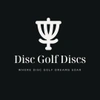If you are new to disc golf, you may have noticed peculiar numbers that line each disc. These numbers are not just for show. It is important to know how to read disc golf numbers when you are out on a course. Below, you can read a breakdown on what do the numbers on disc golf Frisbees mean.
The Breakdown
The brand Innova created a Flight Ratings System to help players understand what kind of Frisbee they are using and how it will work for them. These four categories are: Speed, Glide, Turn, and Fade.
Speed
The first category, speed, is the degree in which a Frisbee travels through air, and it ranges from 1 to 14. If a disc reads “14,” this is the fastest disc on the market today. This is also the Professional Disc Golf Association’s (PDGA) most legal option to use. The faster the disc, the more you will see it cut through the air with less exertion. If your disc reads “1,” you can expect the disc to need more power for it to be thrown in the wind.
However, the slower the disc, the more accurate it will be. Also, if your disc travels with the wind, you can expect it to go further than you thought possible. Beginners should stick with slower discs, while professionals can handle the greater speed options.
Glide
The glide measurement is next, and the array goes from 1 to 7. This numbering system focuses on loft when in flight. For the newest players, discs with more glide are very favorable for all-out distance. On the other hand, less glided discs have better accuracy, especially in situations where wind is a factor. So, the higher the number, the more glide a disc golf player will get from their Frisbee.
Turn
Turn is the third category on the rating system. From +1 to -5, high-speed turn is the ability of the disc to turn over in flight, or head to the right for athletes who throw with their right hand. If you have a disc with a +1, this is the type of disc that will not turn over.
On the other hand, if you have a -5 disc, you can expect this disc to turn over more than any other type on the market nowadays. When looking for roller discs, -3 to -5 are a perfect number. Less turn-able discs are definitely more accurate in the wind. But, if you are a beginner, then you should stick to discs with as much turn as humanly possible.
Fade
The last group on the rating system is fade. Ranging from 0 to 5, the low-speed fade is technology that hooks to the left for people who throw right handed. A rating of 0 stays straight as possible, while a 5 hooks hard at the finish of a throw. People who use discs with a high fade usually are looking to complete a skip or spike shot.

What are a Skip and Spike Shot?
A skip shot is when the disc hits the ground and bounces up to fly again, before finally settling. A spike shot, or a spike hyzer, is the kind of shot that hits the ground vertically, and stops dead in its tracks.
Flight Ratings System are Affected by Plastics
Now that you know how the Flight Ratings System works, it is also vital you know what can affect your disc numbers.
Let us start with plastics, shall we? Different types of plastics can really throw the number system off. Long drivers really are impacted the most because of the thin plastic construction. If you use Champion and Glow Champion brands, they have less of a high-speed turn than other plastics like Driver Pro, Star, and GStar.
The latter named discs keep their characteristics year after year, while the Champion and Glow Champion may start to breakdown soon rather than later. Other plastic discs, whose flight characteristics could change over time, include the R-Pro, DX, CXT, and KC Pro.
If you are a fan of some of these disc options, it may be worth it to you to carry a few of the same model that have different wear-and-tear. This way, you will have discs for a variety of situations, if you find yourself in need.
Throwing By Numbers
Now that you know how to read disc golf numbers, you can go out and purchase the right discs for you. Do not be afraid to try out a few before you come to an agreement on what are the best disc numbers for you. Find you best speed, glide, turn, and fade number discs, and see how well you will perform moving forward.




